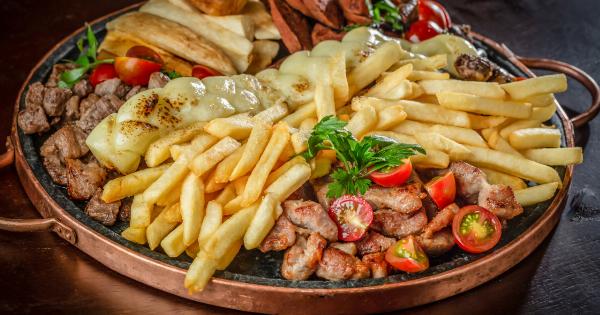Protein is an essential nutrient that plays a crucial role in many bodily functions. It is necessary for the growth, repair, and maintenance of tissues, muscles, hormones, enzymes, and cells.
However, like any other nutrient, consuming too much protein can have negative effects on your health. In this article, we will discuss how to tell if you’re eating too much protein and the potential risks associated with excessive protein intake.
1. Digestive Issues
One of the first signs that you may be eating too much protein is experiencing digestive issues. Protein takes longer to digest compared to carbohydrates and fats.
Consuming excessive amounts of protein can put a strain on your digestive system, leading to symptoms such as bloating, gas, constipation, and even diarrhea.
2. Kidney Problems
Your kidneys play a vital role in filtering waste products from your blood and maintaining the body’s fluid balance.
When you consume excessive protein, your kidneys have to work harder to eliminate the byproducts of protein metabolism, such as urea and ammonia. Prolonged high protein intake can put a strain on your kidneys and potentially lead to kidney damage or even kidney failure in susceptible individuals.
3. Dehydration
Protein metabolism produces nitrogen waste products, and the removal of these waste products requires an adequate amount of water. If you’re consuming too much protein without adequate hydration, it can lead to dehydration.
Signs of dehydration include dark-colored urine, dry mouth, fatigue, and dizziness.
4. Weight Gain
While protein is essential for weight management, consuming too much protein can still contribute to weight gain. Protein contains calories, and excess calories from any macronutrient can be stored as fat in your body.
Additionally, high protein intake from sources like fatty meats or fried foods can be accompanied by large amounts of unhealthy fats, which can lead to weight gain and obesity if not balanced with other nutrients.
5. Nutritional Imbalances
Eating too much protein can result in an imbalance of other important nutrients in your diet.
When you focus too heavily on protein-rich foods, you may unintentionally neglect other vital nutrients such as fruits, vegetables, whole grains, and healthy fats. A well-rounded diet is crucial for optimal health, so it’s important to maintain a balanced intake of all essential nutrients.
6. Bad Breath
Another potential sign of excessive protein intake is bad breath or a pungent body odor. When protein is broken down and metabolized, it produces ammonia as a waste product. This can lead to an unpleasant smell in your breath or sweat.
7. Increased Fullness and Reduced Appetite
Consuming adequate protein is known to increase feelings of fullness and reduce appetite. However, consuming excessive protein can intensify these effects, leading to a reduced overall calorie intake.
While this may be beneficial for individuals trying to lose weight, if protein intake becomes too high, it can lead to inadequate consumption of other essential nutrients or calories.
8. Bone Density Issues
High protein intake, especially from animal sources, can cause an increase in urinary calcium excretion. This can potentially lead to a decrease in calcium availability for bone health.
Over time, inadequate calcium levels may contribute to reduced bone density and an increased risk of osteoporosis.
9. Difficulty Sleeping
Eating too much protein, especially close to bedtime, can interfere with your sleep quality. Protein-rich foods require a longer time to digest, which can lead to discomfort and difficulty falling asleep.
It’s recommended to consume a balanced meal containing protein, carbohydrates, and healthy fats at least a few hours before bedtime for optimal sleep.
10. High Cholesterol Levels
Although high protein diets are often associated with health benefits, excessive protein intake, especially from animal sources, can potentially increase your cholesterol levels.
Animal proteins, such as red meat and full-fat dairy products, contain saturated fats and cholesterol, both of which can raise LDL (bad) cholesterol levels and increase the risk of heart disease.
Monitoring your protein intake is essential for maintaining optimal health. While protein is important for various bodily functions, it’s crucial to strike a balance and ensure you’re not overdoing it.
If you are unsure about your protein needs or have concerns about your diet, it’s always best to consult with a registered dietitian or healthcare professional for personalized advice.



























